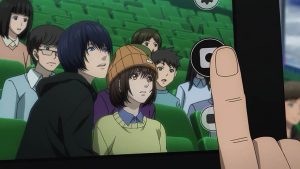 It’s funny, I actually feel sort of guilty for finding Platinum End as entertaining as I do. That sounds stupid I know but I think some of those who read the manga will get what I mean. Part of it is how blatantly it rips off Mirai Nikki. Part of it is that the series is basically a snuff film, and who feels good about themselves for enjoying a snuff film? It’s also just really perverse in a very visceral way (you’re starting to get hints of that, but only hints). The manga plays like a series written by someone(s) who not only have a poor opinion of mankind, but themselves too.
It’s funny, I actually feel sort of guilty for finding Platinum End as entertaining as I do. That sounds stupid I know but I think some of those who read the manga will get what I mean. Part of it is how blatantly it rips off Mirai Nikki. Part of it is that the series is basically a snuff film, and who feels good about themselves for enjoying a snuff film? It’s also just really perverse in a very visceral way (you’re starting to get hints of that, but only hints). The manga plays like a series written by someone(s) who not only have a poor opinion of mankind, but themselves too.
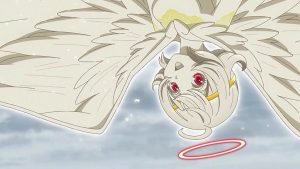 The reality, though, is that for me at least Platinum End (especially early) is fun. And more so in anime than manga form – hearing seiyuu like Kayano Ai and Inoue Kikuko in these femme fatale angel roles adds something to the experience. We got another really good seiyuu addition in Morikawa Toshiyuki, who plays the terminally ill clothing designer and God candidate Mukaidou Nanato. The truth is, after you get past the cream on top, this is actually a pretty weak season. And that makes it easier for flawed but engaging shows like this to make the cut.
The reality, though, is that for me at least Platinum End (especially early) is fun. And more so in anime than manga form – hearing seiyuu like Kayano Ai and Inoue Kikuko in these femme fatale angel roles adds something to the experience. We got another really good seiyuu addition in Morikawa Toshiyuki, who plays the terminally ill clothing designer and God candidate Mukaidou Nanato. The truth is, after you get past the cream on top, this is actually a pretty weak season. And that makes it easier for flawed but engaging shows like this to make the cut.
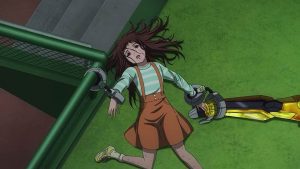 Happily, Mukaidou is also the best character in the cast. He’s the most realistically-conceived, with motivations that have the most traction, and he acts in the most believable manner. He does what almost any guy in his situation would do when the whole angel thing happens – he uses his new powers to provide for his family (by theft, of course), and tries to figure out how he can leave a better world for his wife and kids when he’s gone. And he decides – as any sane person would – that not having Metropoliman as God is the best thing he can do for anybody.
Happily, Mukaidou is also the best character in the cast. He’s the most realistically-conceived, with motivations that have the most traction, and he acts in the most believable manner. He does what almost any guy in his situation would do when the whole angel thing happens – he uses his new powers to provide for his family (by theft, of course), and tries to figure out how he can leave a better world for his wife and kids when he’s gone. And he decides – as any sane person would – that not having Metropoliman as God is the best thing he can do for anybody.
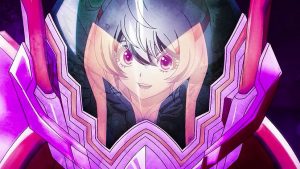 Mukaidou’s plan for the stadium charade is very clever. He uses his red arrows to recruit an army of private dicks and psychologists to fan out through the crowd and try to identify the God candidates who are certain to show up but smart enough not to reveal themselves. And it really isn’t all that difficult when a trained observer knows what to watch for – humans aren’t that good at hiding our reactions after all. The endgame here is finding potential allies to form a united front against Metropoliman.
Mukaidou’s plan for the stadium charade is very clever. He uses his red arrows to recruit an army of private dicks and psychologists to fan out through the crowd and try to identify the God candidates who are certain to show up but smart enough not to reveal themselves. And it really isn’t all that difficult when a trained observer knows what to watch for – humans aren’t that good at hiding our reactions after all. The endgame here is finding potential allies to form a united front against Metropoliman.
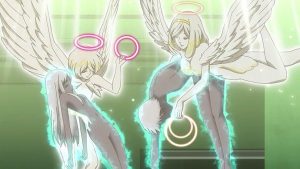 That front is certainly needed, because Metro (real name Uryuu Kanade) is one sick fuck. After disposing of the little girl at the stadium as our heroes watch helplessly – and a little banter with Nasse – he heads back to his mansion to plan the next move. The scene with Uryuu and his friend at school reveals him for basically what he is – a shallow, perverted rich kid who’s been given the power to make his demented wishes come true. With one exception of course – reviving his dead little sister and object of desire, who he keeps in a freezer at home. Being a God candidate isn’t enough to make that happen…
That front is certainly needed, because Metro (real name Uryuu Kanade) is one sick fuck. After disposing of the little girl at the stadium as our heroes watch helplessly – and a little banter with Nasse – he heads back to his mansion to plan the next move. The scene with Uryuu and his friend at school reveals him for basically what he is – a shallow, perverted rich kid who’s been given the power to make his demented wishes come true. With one exception of course – reviving his dead little sister and object of desire, who he keeps in a freezer at home. Being a God candidate isn’t enough to make that happen…


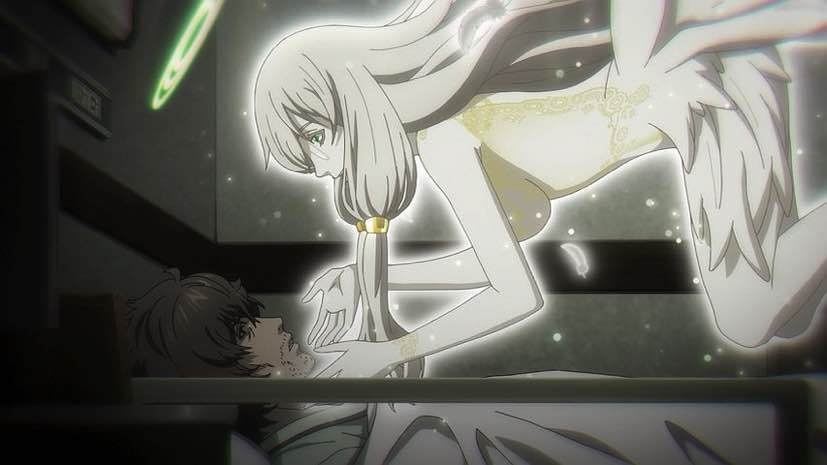
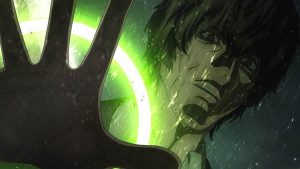
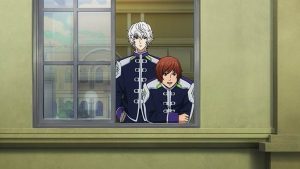
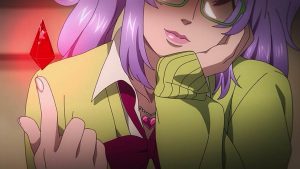
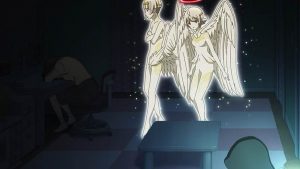

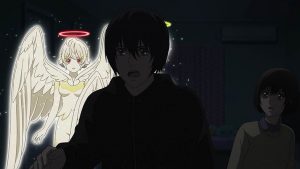
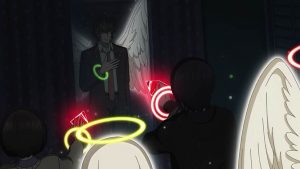
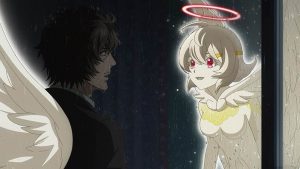
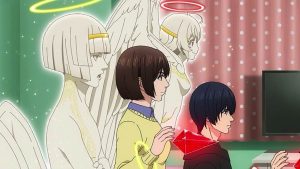

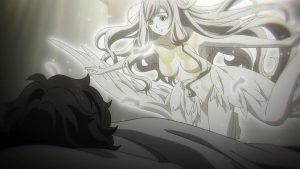
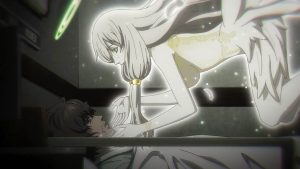
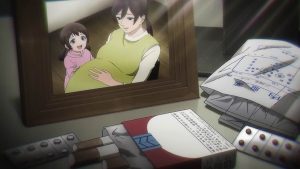
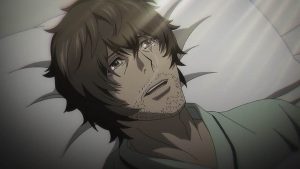
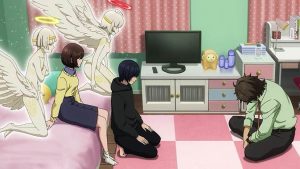
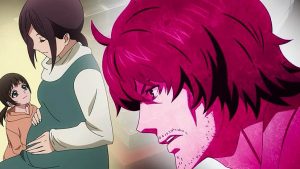
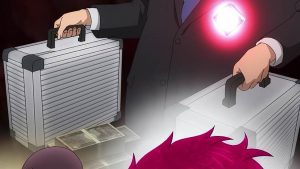
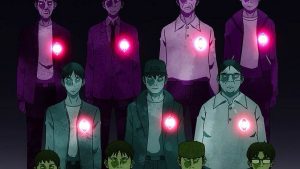
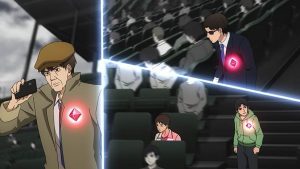
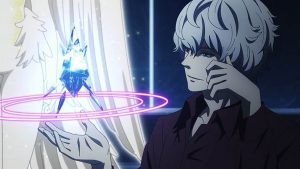
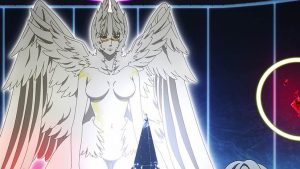
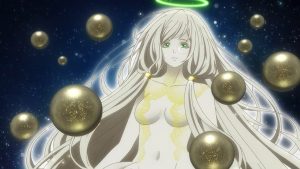
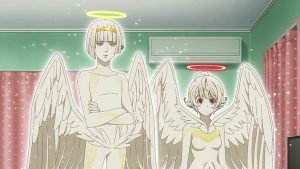
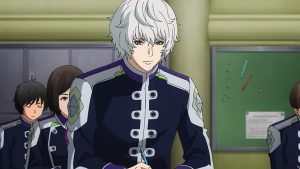
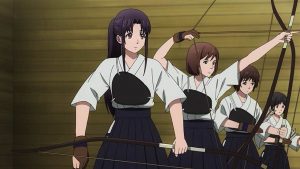

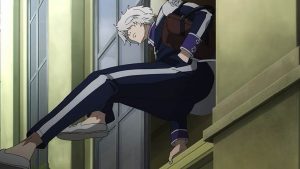
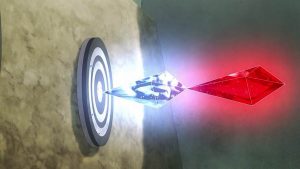
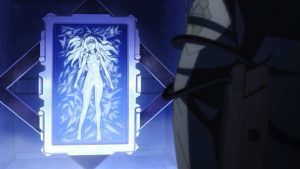
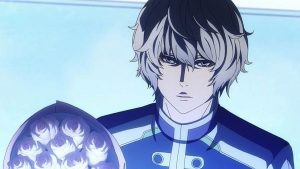
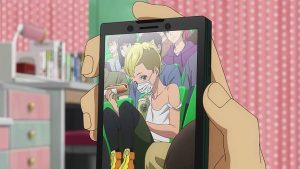
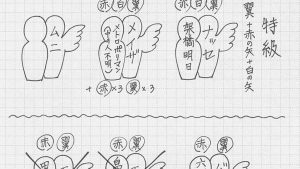
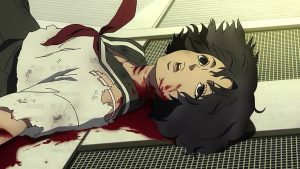


Simone
November 6, 2021 at 8:15 pmI’d forgotten about the frozen little sister on display. Dude is basically like a siscon Jabba the Hutt.
Honestly I don’t think Platinum End reads necessarily as the work of someone who thinks *badly* of humanity, as in, that they think everyone is evil and deserves to die or something. There’s genuinely good people in the story, more than in Death Note if anything. It reads more as a work of someone who’s into existential despair – that even if he thinks there’s good people, the shadow of suffering and death still hang over everything and make it really hard to find joy in it. That’s not the same thing. You can be okay with humanity and still think this world deals it a very shitty hand. It actually bothers me how many people seem to find this view as *morally* questionable – we don’t have a moral duty to be happy, even though our society is obsessed with optimism to a toxic degree.
Guardian Enzo
November 6, 2021 at 11:04 pmThat’s a fair point.